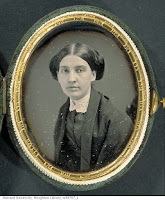So well that I can live without –
I love thee – then How well is that?
As well as Jesus?
Prove it me
That He – loved Men –
As I – love thee –
Fr682 (1863) J456
This short love poem is intense – and pretty flippant. The speaker begins by declaring she loves her ‘thee’ so much that she can live without him. Her love stands on its own strength all on its own. Not for her the neediness of wanting to be by her beloved’s side, look into her eyes, stand together outside in the moonlight, exchange all the little signs and proofs that feed love.
Could this be a poem to ‘Master’? I don’t think so. The Master letters are full of longing; they have a beseeching tone:
Could you come to New England – Would you come to Amherst – Would you like to come – Master? Would it do harm – yet we both fear God – Would Daisy disappoint you – no – she wouldn’t – Sir – it were comfort forever – just to look in your face, while you looked in mine – then I could play in the woods – till Dark – till you take me where sundown cannot find us – and the true keep coming ….” Letter 3, 1861
The letter (as far as we know, never sent – and we don’t really know who Master is, either) does have a bit of playfulness and a bit of boldness. But Daisy (a nickname Emily at times uses to refer to herself) pleads with Master to come. She needs the comfort of looking in his face.
In contrast, the poem’s speaker is confident and challenging. ‘How well do I love you,’ she asks. ‘As well as Jesus?’ Flippant, yes? And then the challenge: “Prove it me / That He – loved Men – / As I – love thee –“. It’s a good challenge. Her love needs no feeding – it exists ‘without’, and I take that to mean without presence, without letters, without rings and lockets and other tokens.
And what about Jesus? Can a case be made that he loved (the past tense Dickinson employs here is interesting) Men as much?
It's different. The Christian New Testament presents Jesus a divine sacrifice: He dies so that humanity might be saved . But there are strings attached to the salvation part. You must be a Christian; you might also have to have been predestined for salvation (this was the Calvinist position Dickinson’s community would be familiar with and generally accept). The point is, there is a heaven for the appropriate believers and there is a hell for the rest.
Well, it’s a comparison impossible to make between the speaker’s love and the love of Jesus for humanity. After all, she has to only love one person. Plus, it is near to impossible to prove a negative. But the rhetoric is strong and that carries the day.
 |
| Susan Dickinson (from Wikipedia |
Could the poem have been written with Sue in mind? Dickinson was becoming used to being ‘without’ her although Sue and Austin – Sue’s husband, Emily’s brother – lived just a hundred yards away. The two women, once passionately inseparable, became much more distant. There was the marriage and Sue’s adjusted role as Mrs. Dickinson; and there was the birth of little Ned in 1861. Some of Dickinson’s other poems point to differences and estrangements, but this poem goes all out for love with no strings attached and no encouragement needed.